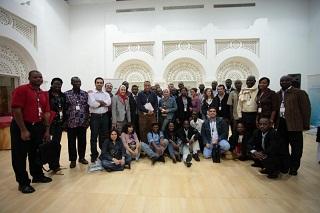Using AI to control energy for indoor agriculture
30 September 2024
Published online 10 March 2010

The World Federation of Science Journalists (WFSJ) announced the start of the application period for the second phase of its rigorous science journalism training programme, SjCOOP, on 5 March 2010.
The programme aims to strengthen journalistic skills and build new ones for science journalists in the Arab region and Africa.
The programme twins mentees from the two regions with professional, experienced mentors. It will run from September 2010 to September 2012, with mentees being required to learn, report, and attend workshops and extensive training courses.
All parts of the training will take place in the journalists' native languages, with the programme being offered in Arabic, English and French.
The first phase of SjCOOP ran from 2006 to 2009. Although more than 80 people benefitted from it, only 32 journalists made it to the end and graduated from the course.
"The programme made a huge difference to me. I learned so many new skills, and not just from the mentors, but from the mentees with me as well. One day I was doing an interview, the next I was doing investigative journalism," said Nehal Lasheen, who is an editor at IslamOnline.net and one of the graduates of the course.
"It was very time consuming and stressful but this was always an incentive to continue producing material for me," she added.
SjCOOP is the flagship project of the WFSJ. Regional networks of science journalists and communicators contribute through mentors who are fluent in the different languages of the project.
"The first SjCOOP was the first time a training programme of this magnitude was done in this region. With the second phase, we will build on the experience we learned from phase one. We will try to evade any problems we had in the past with managing such a very large regional mentoring project," said Nadia El-Awady, who is president of the WFSJ.
The new phase will also offer more focus on promoting transborder stories, with mentees from different countries working together on a series of pieces on a certain topic.
The organisers also designed the programme to be able to measure the effect that the mentees' reporting is having on science policy in the region.
"By the end of the first phase, we started noticing that there was a very positive effect with regards to people and the space available to produce science stories in media outlets. But we had no way to measure this impact. This is now built into the new programme from the onset," explained El-Awady.
The first phase had a large effect on the participants. They launched tens of science radio and television shows, as well as the first pan-African science magazine. Twenty-two of the participants also went on to win 44 prizes, awards, scholarships and internships due to the skills acquired.
"For me, the most important thing was that it gave me regional and international exposure, giving me the chance to write in other publications from different parts of the Arab world," said Lasheen.
The UK Department for International Development (DFID) is the main funder of the project. The International Development Research Centre (IDRC) is also funding parts.
The WCSJ hopes to expand the programme to include other regions, such as Latin America and Southeastern Asia, but limited funding is hindering efforts.
"The problem is that funding agencies currently want to fund projects in Africa, and this is really impacting our ability to get funding for other regions in the world," said El-Awady.
"Sadly this means there is an unfair dividing of funds around the world. We know there is a strong need in Africa and the Arab region for such projects, but we also know that other areas need them just as much."
Mentee applications will be accepted until 24 April 2010, with selections being announced in early June 2010.
Interested candidates can apply online here.
doi:10.1038/nmiddleeast.2010.120
Stay connected: